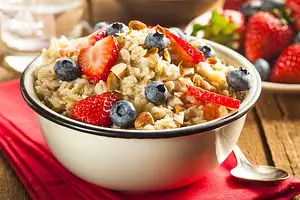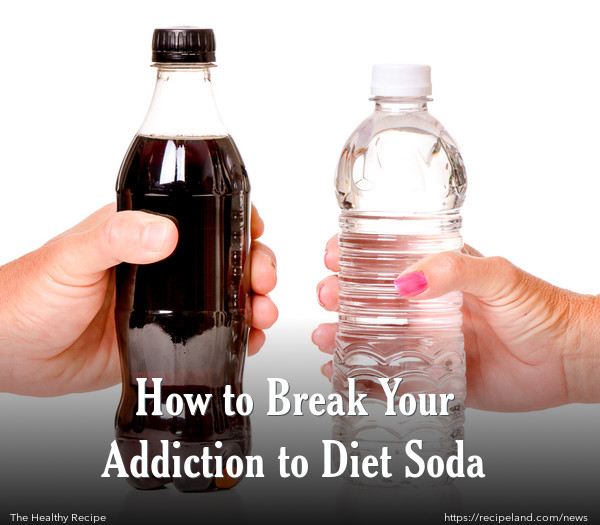Many people opt for diet soda as a replacement for the full sugar version, thinking that they are doing themselves a favour. This is not necessarily the case. Nutritionist Marion Nestle, Ph.D., professor of nutrition at New York University and author of a soon-to-be-release book, Soda Politics: Taking on Big Soda (and Winning), stated, “Not only is there little evidence that diet drinks help people lose or maintain weight, but there's some evidence that diet drinks cause similar metabolic problems to sugary drinks."
A recent study conducted at the University of Minnesota examined nearly 10,000 adult participants and concluded that consuming only one diet soda per day increased the risk of developing a metabolic syndrome by 34%, and was found to potentially trigger several problematic symptoms, including increased belly fat and high cholesterol, which can lead to heart disease.
Jacob Teitelbaum, M.D., the author of the book Complete Guide to Beating Sugar Addiction, stated, "Anything with a heavy sweet taste, even if it's not technically sugar, may stimulate insulin release. When it becomes excessive, you start to see a rise in insulin resistance, diabetes, and heart disease."
One way that diet soda, or other sweet treats, becomes addictive is that your taste buds get used to the sweet taste and trigger cravings, which increase until they are difficult to satisfy. Diet soda, with its artificial sweeteners, has been shown to cause tooth decay, reduced bone density, and reduced kidney function. Diet soda also increases the risk of obesity.
A recent study conducted at the University of Texas Health Science Centre showed that drinking two or more cans of diet soda could result in a waistline increase of up to 500%. Kicking the diet soda addiction does require some effort. It’s best to wean yourself slowly. Start by cutting down by one can per day for about two weeks, and replacing with water.
Teitelbaum explains that it is important to not only reduce your intake, but also to understand what is behind the addiction. "The issue is that it's an addiction—there's something driving the craving. If you don't address what's driving the craving, it won't go away."
There are several common reasons why people might be addicted to diet soda, and here are some tips for addressing these issues.
1. You drink diet soda for increased energy.
Many people reach for a diet soda when they need a pick-me-up. This often indicates that you are actually craving the caffeine in the soda. The best way to detox from this problem is to switch to coffee or tea, which are much healthier ways to get your caffeine fix.
Coffee and tea both contain antioxidants, which offer plenty of health benefits. If you want a little sweetness, it’s okay to add some stevia, which is a natural sweet plant extract, or even some honey. Avoid table sugar and artificial sweeteners.
2. You reach for a diet soda when your blood sugar drops.
If you experience irritability, shakiness, or feelings of lightheadedness during the day, it might be caused by problems with your adrenal glands. Your adrenal glands are responsible for making more blood sugar.
Teitelbaum states, "Their job is to make more sugar during periods of stress. When they get exhausted from being chronically activated, your blood sugar will drop and you won't have the hormones to manage it." If this is the cause of your diet soda addiction, you want to try and limit your every day stress.
Also, keep your blood sugar in check by ensuring that you are eating proper meals, with plenty of protein throughout the day. Eat lean, high protein snacks, and plenty of healthy fats. Vitamin C and vitamin B5 supplements can also help to support your adrenal glands and ensure they are functioning properly.
3. You drink diet soda to feed a yeast imbalance in your body.
Do you have symptoms like chronic nasal congestion, sinusitis, irritable bowel syndrome, or spastic colon? You might be experiencing the effects of having a yeast imbalance, which can be made worse by consuming high amounts of diet soda.
To remedy this problem, add probiotics and take out the diet soda. If you love the flavour of diet soda, Teitelbaum recommends that you add stevia, cinnamon, and nutmeg to your tea, or try fruit-infused seltzer or water.
4. You drink diet soda to handle hormone fluctuations.
When you experience symptoms of PMS or perimenopause, the hormone fluctuations can lead to other problems like insomnia, headaches, fatigue, or mild depression, which all lead to sugar cravings.
To kick this problem, try strategies that will kick up your estrogen, which helps produce more of the feel-good neurotransmitters like serotonin, dopamine, and norepinephrine. Teitelbaum recommends using tips from Japanese women who opt for adding soy milk or edamame to increase isoflavones and help stimulate estrogen production in the body.
It can take a week or more to really start experiencing the benefits of kicking the diet soda addiction, more or less depending on the root cause. Time to get started! If you really love diet soda, then indulging every now and then probably won’t hurt you, but it’s wise to take it out of your everyday diet.










Comments
All soda is bad for our health, which has been approved by tons of research. Not sure what kind of research you have been reading!
Contrary to the misinformation featured here, research has repeatedly reaffirmed that low-calorie sweeteners are safe, and can help cut calories and promote weight loss. A study published in the American Journal of Clinical Nutrition verifies this fact, as well as debunks the myth that diet beverages cause an increased preference for sweet foods and beverages: http://bit.ly/Ik4zjC. In other words, diet soda and other beverages can be part of a healthy balance, and are no cause for concern.
-American Beverage Association